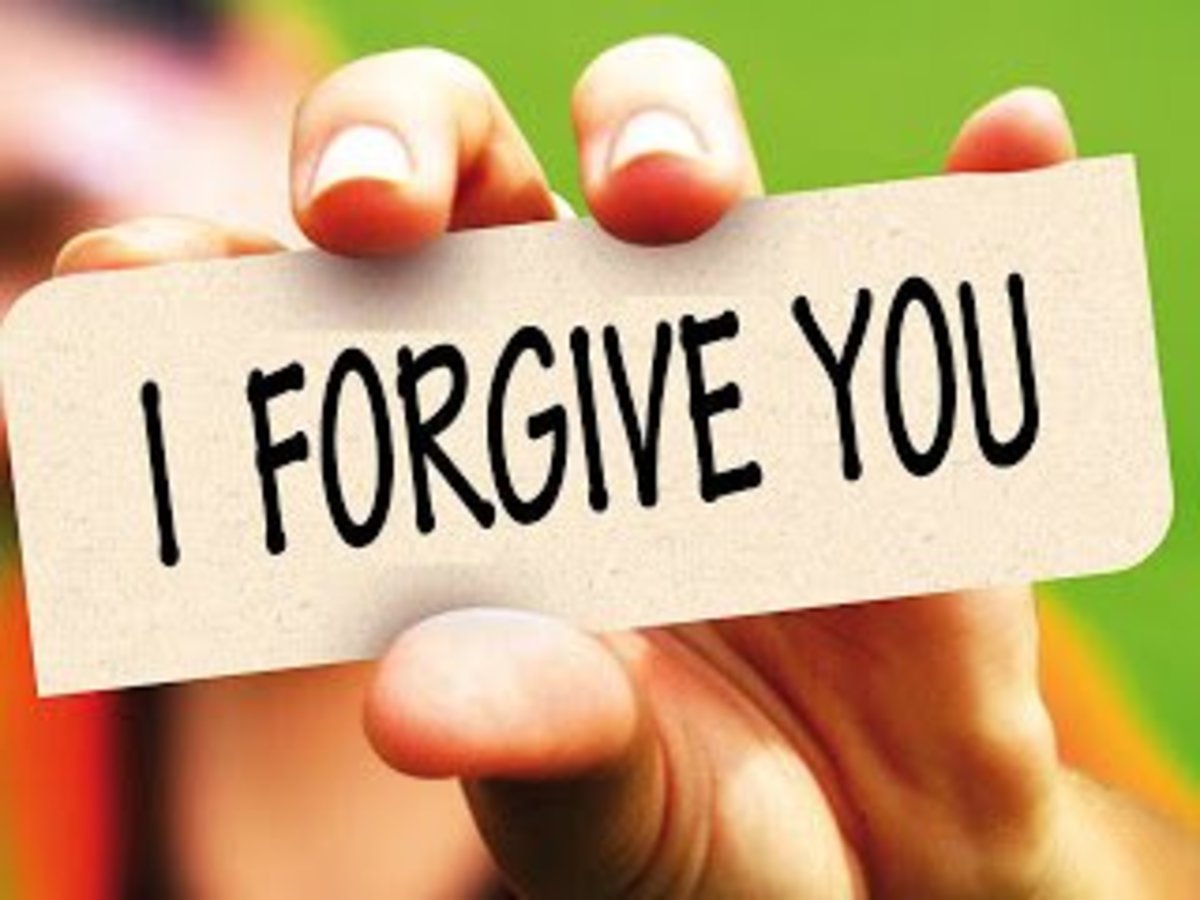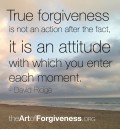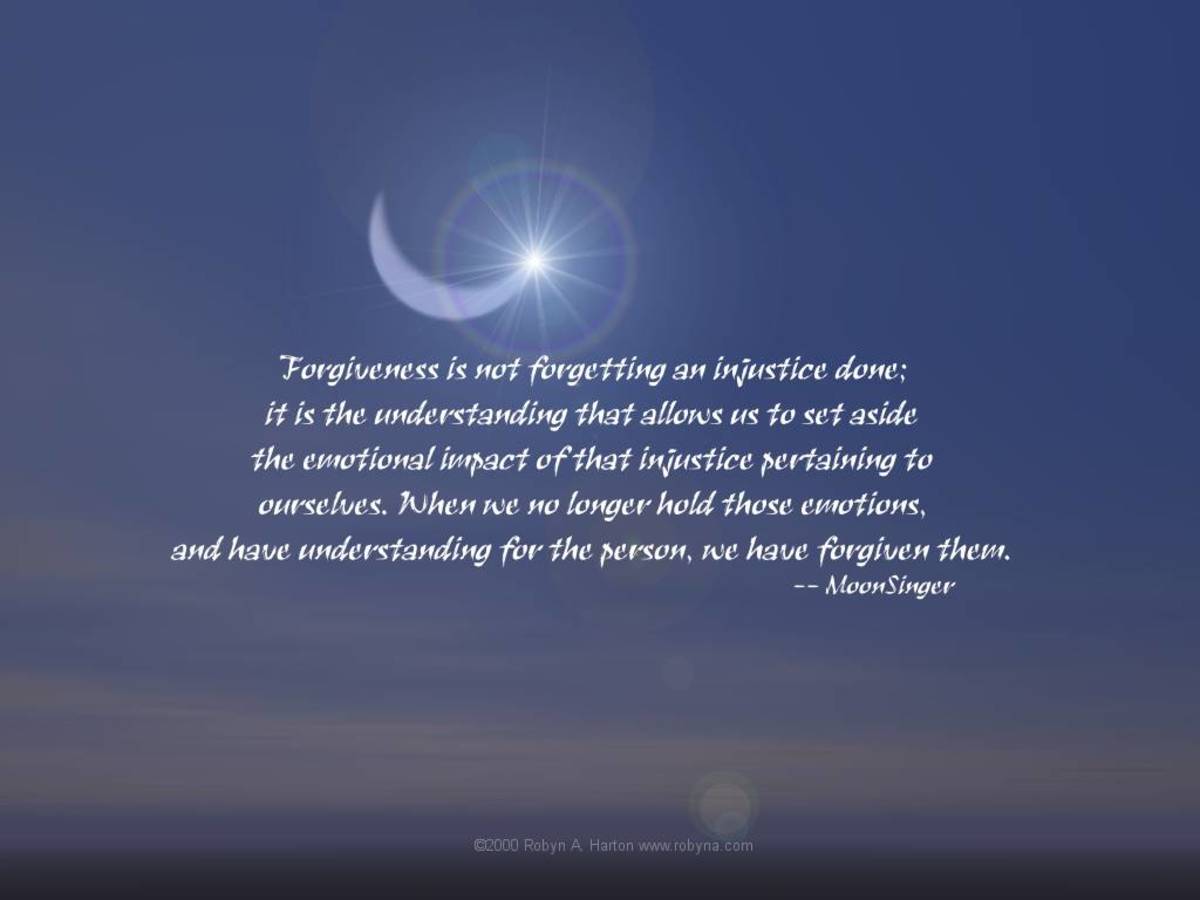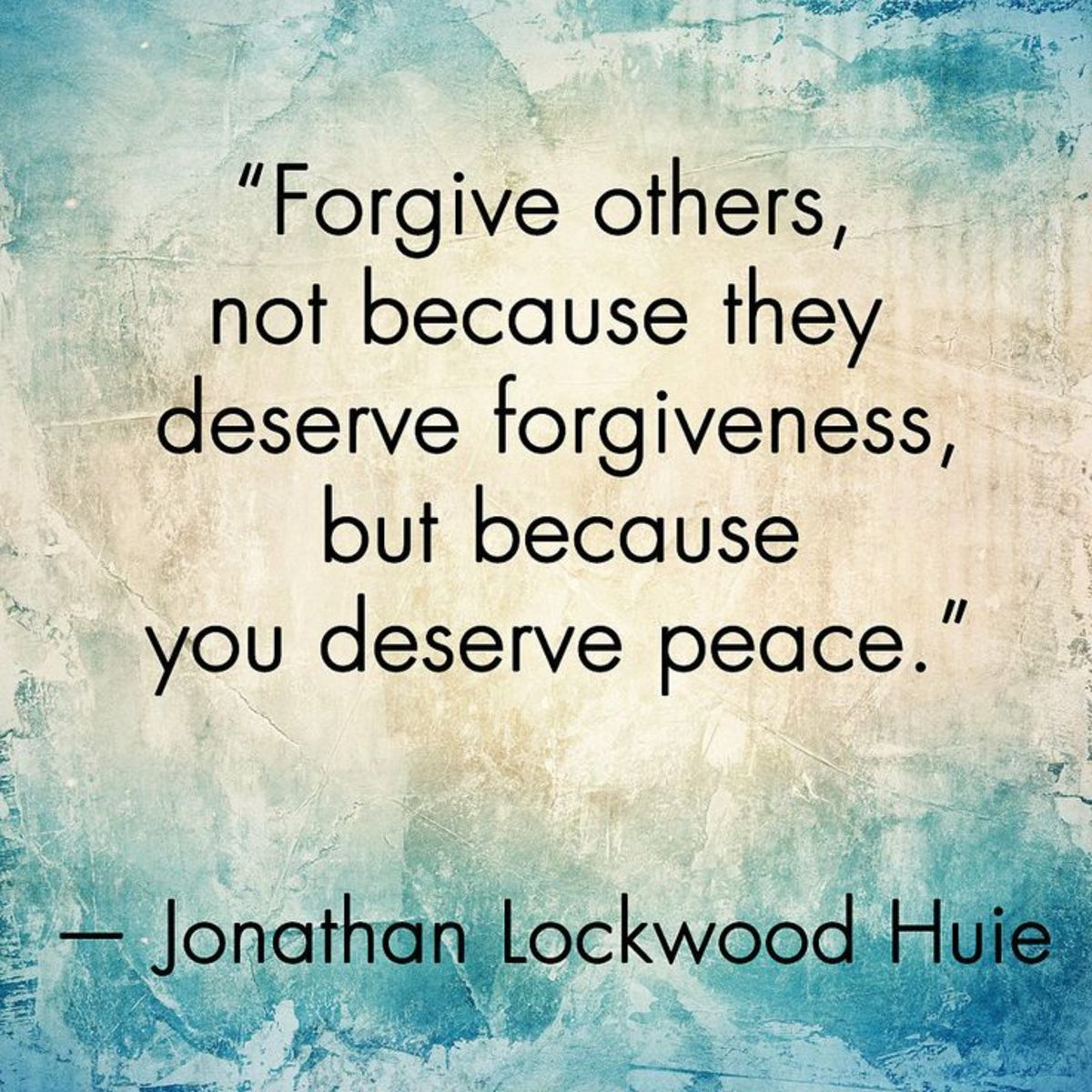Forgive, Forgiving, Forgiveness
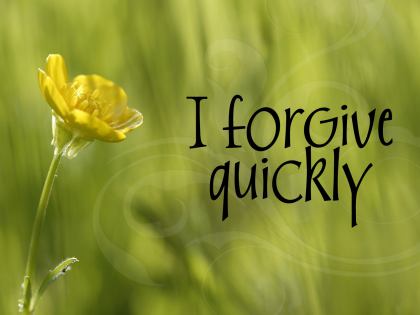
Imagine someone is stealing your car so you tie a rope to the bumper and yourself to the other end. The car starts up and you are about to be dragged off. Someone says to you: "Untie the rope and let it go, it will kill you!" To which you reply: "They are in the wrong, they should stop, not me."
One of the best ways I know to build the relationship of your dreams is to understand and use the incredible power of forgiveness. Nothing causes more damage than withholding it and yet nothing releases more happiness and freedom than that simple action. We all know about it but, surprisingly, most of us haven't a clue about how it works or how to use it properly.
Even when it seems we will be diminished by the action, forgiving someone has its greatest impact on us. We are the ones released from the debilitating and destructive weight of anger, bitterness, resentment and depression.
If that is true, why is it that there is so much unforgiveness in our lives? I think that it exists because we have lost sight of how it works and who it is for. We think it has to do with our rights being violated. We think we are entitled to be treated according to an arbitrary code of conduct and we expect others to change if they don't meet our standard. Forgiveness is about acceptable boundaries, it is about viewpoint and it is about a philosophy of life. In this article, the car at the end of a rope tied to us is the idea of Rights and Punishment. Untying the rope is a three part process: Forgive, Forgiving and Forgiveness
First a definition
There are two main definitions of forgiveness. The first involves the pardon of an offender and the offense. The second has to do with releasing a debt owed to you. I said earlier that there is a lot of misunderstanding about forgiveness and I believe it starts in how we define it. In my opinion, true forgiveness always involves both of these actions.
To forgive is to set a prisoner free and discover the prisoner was you ~ Unknown
Forgiveness is me giving up my right to hurt you for hurting me. ~ Anonymous
Rights and Punishment
When someone wrongs you or offends you, you may not be angry every time, but almost always there is the moral indignation, the sense that it is not fair. You want remorse or at least acknowledgment by the other person of the wrong they did to you. They owe you an apology and they need to make it right. Often this is exactly what happens. The person realizes what they did, apologizes and tries to make it right. The wronged person, in turn, forgives the offender and in many cases relinquishes any debt if the offender cannot repay it.
All too often, however, they either do not believe they offended or wronged you or they simply do not acknowledge it and go on as if nothing happened. Sometimes we don't believe they are sincere even if they do say they are sorry and we continue the estrangement. This is when the idea of rights and punishment comes into play. If we see that person again, we say to ourselves that they violated our rights, they owe us a real apology and we need to punish them by withholding affection or civility and often we give them a piece of our mind. You might even employ the old adage, "Don't get mad, get even" and try to even the score. They need to be punished so that they feel the blame for what they did and do something about it. If this is a method you use, I will ask the therapists' question:
How is that working for you?
My parents' first child, my sister, I'll call her Mary, was fifteen when she was in the care of a cousin, along with a younger sister. They were playing near a creek and decided to ride a log in the water, since neither could swim. The current upended them and the youngest was going down for the fourth time when Mary pushed her to shore, losing her own life in the process. I was only one at the time and so I do not remember her. All those who knew her described her as one of those almost "perfect" children whose sweetness, positiveness and selflessness impressed everyone she met.
Her loss devastated my mother, who never forgave (until just before her death) the cousin who was supposed to be watching them. My mother was an exceptional woman who helped everyone she knew who needed it, but all her adult life, she carried a bitterness and resentment for the cousin who she felt was responsible for the loss of her precious child. The pain of the loss was immense, but the bitterness she carried was responsible for a diminishing of her abilities and her own normally bright nature. She kept the newspaper notices, the funeral program and photos and looked at them with renewed pain and anger at various times.
To this day, I do not believe the cousin knew about the resentment, nor felt it was his responsibility, since he was not much older than they were.
It was my mother who felt her right to trust had been violated and the smoldering resentment and bitterness punished her all her life. Not only that, she was the hardest on herself for allowing a young kid to watch her girls and even if she could have forgiven the young cousin, she was not able to forgive herself. It wasn't until one day I saw a note to her sister that said: "Tell her that I got rid of all of Mary's notices and things." It was her way of saying she had been dragged by that car long enough and she finally untied the rope.
It might help to look at the sentence:
"They owe me an apology!"
"They owe..." implies that we think we have some sort of ownership rights in another's thoughts, words or actions. If they say or do something we don't like, we feel they are obligated to act in a way that undoes the previous hurt or offense and conform their actions to our standard of proper conduct. In other words, they are the car and we have tied our rope to their bumper.
"How silly, you say. I don't own them." And you are right. You don't. In a previous article, Joy for You and Me, I introduced Winsome's three steps of joyful relationships. The first was:
1. What others think of you is none of your business--another way to say this is you have no rights in or ownership of another's thoughts, words or actions. They own them and you own yours. They are only responsible for their words and actions and you are only responsible for yours. Once you start thinking that no one owes you in a relationship, the less you will be hurt by them and the sooner you can truly understand the idea of forgiveness.
For example, suppose your best friend says something critical about you and you find out about it. Your first reaction may be to feel badly about yourself and hurt that they would say it. Your second reaction is a sense of violation and defensiveness. You feel they "owe" you an apology and they need to take it back. Not only that, they must be "Punished" so you act differently towards them.
This causes them to become defensive and you both sink to a lower and lower form of relating. "I can't believe you said that about me! I thought you were my friend. I haven't said anything about your (defect or actions!) I'm not going to speak to you and you can forget about the party I was going to give you!"
What if, instead, you relinquished ownership of their statement?
If you don't own it or have no rights about what they say, it stays their property and their problem. Now all that exists is an issue that can be talked about. Instead of the above dialogue, it could go like this: "I heard that you said _________ about me. Would you like to talk about it?" Separating the person from the action frees you up to talk about the issue without the emotion that taking it in would cause. There are no rights violated if you don't own their words and therefore no need for punishment, there is just an issue which may or may not need to be addressed.
Let's use the car analogy again--when you first discover the offense, ask yourself: "Do I really want to tie a rope to the bumper of this issue?" Some of the ways we attach the rope is:
a. Taking it personal--This allows their problem with you to become your problem with you.
b. Redefining them--Not everyone who hurts you is your enemy
c. Getting personal--Instead of addressing the problem you comment on their motivation or make personal comments about them.
d. Focusing on YOUR feelings--Remember that it is their issue, not yours, focus on their feelings even if you don't agree with their actions. Caring enough to address their feelings can often resolve the issue.
e. Looking for ways to blame others--Making excuses or transferring blame is a waste of time and usually destructive. Relationship building is best when you eliminate issues rather than add to them.
f. Refusing to apologize--Everyone can listen and offer some kind of empathy. It is ideal if you can truthfully say "I am so sorry that you are hurt. I would never intend to hurt you. Please forgive me."
If you cannot say that, at least say something like this: "I understand what you are saying and I hear how you feel. If I were you I would feel the same way." If you were them you would feel as they do and even though you disagree, saying it this way lets them know you are trying to see their viewpoint.
I. FORGIVE The first stage of forgiveness is the act itself
We differ from all animals. It is not our capacity to think that makes us different, but our capacity to repent, and to forgive ~ Alexander Solzhenitsyn
If you visualize the car and the rope, you can see why forgiving someone frees you up from harm. This is a lot easier to do if you don't take it personally, but even if you do, pardoning them for the offense and relinquishing their debt to you still will put you in a safer and higher place.
But what does this do for the offender? You might ask. Doesn't this send the message that they can do this again? Where is the justice? First, let me remind you that it is not your job to teach them how to be--your job is to be the best you can be and communicate honestly your needs and feelings. If they care about you, they will listen to you and make their decisions.
Forgiveness is choosing to love. It is the first skill of self-giving love. ~ Mahatma Gandhi
Whoever is forgiven much, loves much ~ Luke 7:47, The Bible
To forgive is the purest way to show love. Anyone can love a person who is nice to you and builds you up. The hardest person to love is someone who attacks your spirit or self-image or betrays you in some way. None of us would probably share bread with a Judas without saying something about the betrayal he was about to do. Without telling him how much he is hurting us. Jesus not only shared his last meal with him, but He washed Judas' feet along with the others and on the cross said "Father, forgive them for they don't know what they are doing."
When you give up your right to be understood or appreciated and are confident of who you are, you too can say "If they really knew who I was they probably wouldn't act the way they do."
Forgiving is a matter of perspective. As long as I focus on the "wrong," I am focusing on myself and if I think of the other person at all, it is to right the wrong. If I refuse to take ownership of their actions, I can focus on the other person and not myself. I can find out what their concerns are and help both them and myself in the process.
If you need help doing this stage of forgiveness, consider all the times you were forgiven even when you were unrepentant and totally in the wrong. How did it make you feel? Didn't it make you a better person? Part of the familiar "Lord's Prayer" is forgive us our offenses (or trespasses) as we forgive those who have offended us. If my being forgiven depends on my forgiving others, then it wouldn't hurt to make it a regular habit.
II. FORGIVING--The second stage of forgiveness is to allow this to become your personality
Have you ever had a grandparent or teacher or friend with whom you could just be yourself and know they would generously overlook your cross words or selfish actions. Those are the kind of people you want to spend time with--the people you go to for comfort or counsel. There is nothing so disarming and empowering than a forgiving person.
Becoming a person who is known to keep short accounts and forgive quickly fits in with the second step of joyful relationships: 2. What others say or do to you does not absolve you of your responsibility to be yourself and respond with character, not sink to their level of acting or talking.
Jean ValJean of Les Miserables is released from prison after 18 years for stealing a loaf of bread and then trying to escape. He is forced to wear a yellow badge that reminds everyone that he is a criminal. The Bishop of Digne was warned to lock his door to keep ValJean out, but instead leaves it open and when Jean arrives, he takes him in, feeds him and gives him a place to sleep. Jean thinks the Priest is like everyone else and steals his silverware.
Priest (to dismayed house servant):
So we'll use wooden spoons.
I don't want to hear anything more about it.
Officer arrives to Priest's home and rap on door with an apprehended Valjean.
Officer: I'm sorry to disturb you.
Priest: You caught him!
Officer: I had my eye on this man.
Priest: Thank God.
(turning to Valjean)
I'm very angry with you, Jean Valjean.
Officer: (taken aback by the Monseigneur's black eye)
What happened to your eye, monseigneur?!?
Priest: Didn't he tell you he was our guest?
Officer: Oh, yes.
After we searched his knapsack
and found all this silver...
he claimed...
that you gave it to him.
Priest: Yes. Of course
I gave him the silverware.
(to Valjean in faux dismay)
But why didn't you take the candlesticks?
That was very foolish.
(to housekeeper, hurriedly)
Mme Gilot, fetch the silver candlesticks.
They're worth at least -- francs.
Why did you leave them? Hurry!
M. Valjean has to get going.
He's lost a lot of time.
Did you forget to take them?
Officer: Are you saying he told us the truth?
Priest: Of course.
Thank you for bringing him back.
I'm very relieved.
Officer: Release him.
Jean Valjean (in total bewilderment): You're letting me go?
Officer: Didn't you understand the bishop?
Priest: Mme Gilot, offer these men some wine.
They must be thirsty.
Officer: (retreat into the house) Thanks.
Priest (turns to Valjean with a new fire in his eye reflected in his hushed tone):
And don't forget...
don't ever forget
you've promised to become a new man.
Promise.
Valjean (tears welling in disbelief): Why are you doing this?
Priest: Jean Valjean, my brother,
you no longer belong to evil.
With this silver, I've bought your soul.
I've ransomed you from fear and hatred.
Now I give you back to God.
This generous act of forgiveness is what releases and inspires ValJean to become the honest, successful and forgiving man that shines through the novel.
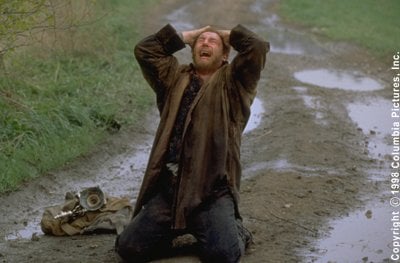
III. FORGIVENESS--The third stage is creating an atmosphere of forgiveness
Nothing I know can do as much good as forgiveness and nothing can do as much harm as refusing to give it.
Did you ever wonder why it is so hard to stop a war once it has begun? Have you wondered why it is so hard to stay out of or get out of a gang in the ghetto? Have you ever wondered why it is so difficult to keep the majority of marriages out of divorce court?
I believe it is because there is a failure early on in marriages, in gangs and in national conflicts to give others the benefit of the doubt. We refuse to forgive and that leads to divorce, gang violence and war.
Anti-war movements are usually too little and too late. Most wars, once begun, are difficult to reverse and the price is enormous in lives lost as well as countless mental and physical injuries. What if cultivating an atmosphere of understanding, forgiveness and mutual acceptance would stop wars before they begin?
I read the early background of two famous war antagonists--Adolf Hitler and Ho Chi Minh. Young Adolf had a stern father who would never forgive him for less than optimum study habits and grades. Time after time, Adolf would fail in his father's eyes and as far as I could see, his father never forgave him for the poor performance. Adolf was sent to a boarding school where he was introduced to another unforgiving man, a teacher who filled Adolf with anti-Jewish thought and emotional prejudice.
Cost of unforgiveness in the life of Adolf Hitler: In World War II, over 60 million people (1/3 military & 2/3 civillians) killed--2.5% of the world population.
Ho Chi Minh worked in the United States and was educated in England. In my opinion he was impressed with the democracies of both countries and when he was in a position of influence in Vietnam, he asked the Western Powers at two different times for help in developing independence for his country. Following World War I, he petitioned for recognition of the civil rights of the Vietnamese people in French Indochina to the Western powers at the Versailles peace talks, but was ignored. Citing the language and the spirit of the U.S. Declaration of Independence, he petitioned U.S. President Woodrow Wilson for help to remove the French from Vietnam and replace them with a new, nationalist government. He was unable to obtain consideration at Versailles and the failed effort had the effect of further radicalizing him and making him a national hero in Vietnam.
During World War II, Japan overran the country, driving out the French. After the war, Ho Chi Minh asked the superpowers to allow the country to develop independence. Instead, France was awarded the South and China the North. China cruelly ruled North Vietnam causing wide support of Ho Chi Minh. The south was ruled by the corrupt Diem and caused sympathy to arise for the independence and unity movement called the Viet Cong.
In 1946, they chased out the Chinese communists. Instead of championing that movement and forgiving the past, France attacked the North, forcing Ho Chi Minh into the arms of Russia and China. Instead of supporting Minh's independence ideas, America took over where France left off and drove Vietnam further and further into savage resistance and communist control.
I'm not saying Minh was a saint, I am only trying to illustrate that with every individual there are tacts that lead to understanding and self-determination and there are actions based on control and selfishness that lead to suffering and sometimes prolonged and deadly war.
Cost of unforgiveness with Ho Chi Minh: 60,000 US soldiers, almost 3 million Vietnamese soldiers and civillians killed as well as untold numbers of emotional and physical injuries.
War is thus an act of force to compel our enemy to do our will. ~ Carl Von Clausewitz, Prussian military general and theoretician
The Third Step of Joyful Relationships--3. Try telling yourself before you interact with someone, "I may not agree with this person nor approve of some things they do or say, but I will totally approve of them as a person. They can do nothing to change my resolve about this."
I have tried to show you some radical ideas about life-changing relationships.
When you forgive, you untie the rope which ties you to a destructive force that can kill you.
Refusing to take ownership of destructive words or actions allows you to focus on the other person rather than yourself.
Separating the issues from the person allows you to approve of them and keep your friendships intact.
Focusing on the needs of others rather than your own selfish agenda can transform nations and actually save millions of lives.
Eleanor Roosevelt said, “No one can make you feel inferior without your permission.”
One of the reasons we find it hard to forgive others is because we are following a script we no longer believe. All of us tell stories to ourselves that have no basis in fact. We may see ourselves as a martyr, a sensitive soul, one who is not truly appreciated by others or even as a person we identify with in a movie or series. We may even be acting out of habit to an adolescent conviction that we have long outgrown.
Try to examine your actions when the opportunity to forgive is fumbled and ask yourself: "Is this really what I believe? Is this the kind of person I want to be?"
All of us can rewrite our story. Write in the person you would like to be. Fill your day with the positive things that support that person. Surround yourself with people that personify the forgiving and understanding person you are beginning to see in your own mirror.
Be choosy where you tie your rope. Tie it to your dreams, your hopes--as Abraham Lincoln said: "To the angels of your better nature." The world needs superheroes, but not with weak attributes like flying or superstrength. The world needs ordinary people like you and me whose greatest power is the ability and willingness to forgive.

